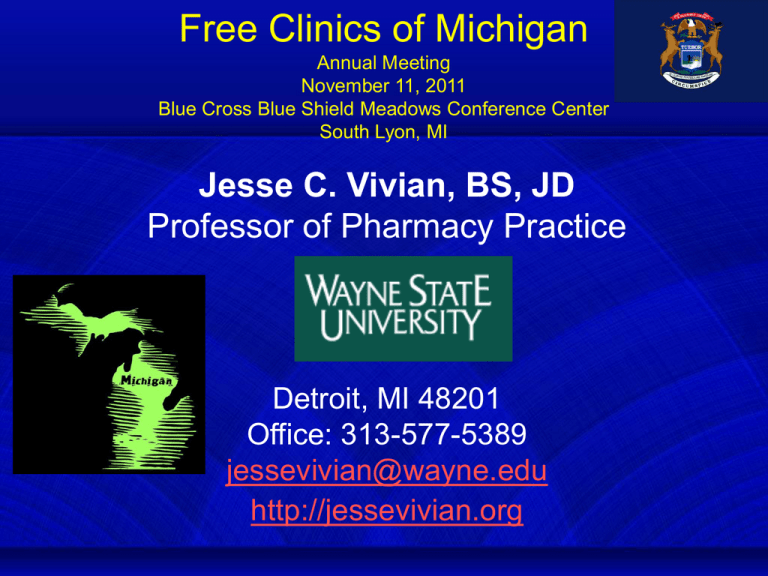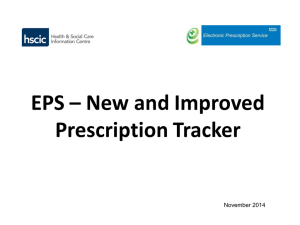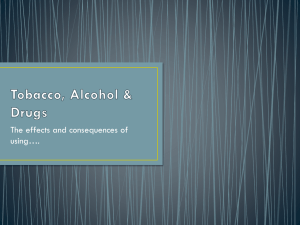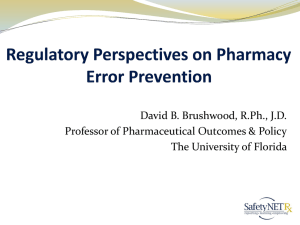PowerPoint - Free clinics of michigan
advertisement

Free Clinics of Michigan Annual Meeting November 11, 2011 Blue Cross Blue Shield Meadows Conference Center South Lyon, MI Jesse C. Vivian, BS, JD Professor of Pharmacy Practice Detroit, MI 48201 Office: 313-577-5389 jessevivian@wayne.edu http://jessevivian.org Wayne State University Cultural Center of Detroit Old Main Erroneous Images Promotional Marketing ANY UNIVERSITY CAN EXPAND YOUR MIND. WE EXPAND YOUR LIFE. AIM HIGHER Distribution of Drugs in Free Clinics 1. 2. 3. 4. Laws and Regulations Licensing Security Prescribers (MD, DO, NP, PA, others) 5. Pharmacists Voluntary Involvement 6. Nurses Voluntary Involvement My Involvement • Pharmacists (RPh) wanting to get involved • Want to know laws, regulations, liability • Controversy – Some Rphs • Can’t be done unless building is licensed as a pharmacy • May be allowed if certain conditions satisfied • Just do it April/May, 2011, Vol. 49, Issue 2 http://viewer.zmags.com/publication/4e32abed#/4e32abed/7 Laws of Free Clinic Drugs • Clinic Must Have Physician (MD, DO) designated as the “Medical Director” • Medical Director must obtain a “Drug Control License from the MI Board of Pharmacy • Medical Director must develop Policies and Procedures Manual – Must Include policy on who, when, where and why others MAY be delegated to distribute drugs – Do not confuse “dispense” with” distribute” Drug Control License MCLA § 333.17745(1) http://www.michiga n.gov/lara/0,4601,7 -154-27417_27648--S,00.html PUBLIC HEALTH CODE (EXCERPT) Act 368 of 1978 333.17745 Drug control license (1) Except as otherwise provided in this subsection, a prescriber who wishes to dispense prescription drugs shall obtain from the board a drug control license for each location in which the storage and dispensing of prescription drugs occur. A drug control license is not necessary if the dispensing occurs in the emergency department, emergency room, or trauma center of a hospital licensed under article 17 or if the dispensing involves only the issuance of complimentary starter dose drugs. PUBLIC HEALTH CODE (EXCERPT) Act 368 of 1978 333.17745 Drug control license (2) A dispensing prescriber shall dispense prescription drugs only to his or her own patients. • Begs question of physician-patient relationship – What are the factors to be included? – Can a telephonetic/ computer image connection apply? – Are “own patients” those of the clinic of just the prescriber who sees the patient once and another physician sees that patient on another visit to the clinic – How to document prescriber’s “own” patients? PUBLIC HEALTH CODE (EXCERPT) Act 368 of 1978 333.17745 Drug control license 3) A dispensing prescriber shall include in a patient's chart or clinical record a complete record, including prescription drug names, dosages, and quantities, of all prescription drugs dispensed directly by the dispensing prescriber or indirectly under his or her delegatory authority. If prescription drugs are dispensed under the prescriber's delegatory authority, the delegatee who dispenses the prescription drugs shall initial the patient's chart, clinical record, or log of prescription drugs dispensed. In a patient's chart or clinical record, a dispensing prescriber shall distinguish between prescription drugs dispensed to the patient and prescription drugs prescribed for the patient. A dispensing prescriber shall retain information required under this subsection for not less than 5 years after the information is entered in the patient's chart or clinical record. PUBLIC HEALTH CODE (EXCERPT) Act 368 of 1978 333.17745 Drug control license (4) A dispensing prescriber shall store prescription drugs under conditions that will maintain their stability, integrity, and effectiveness and will assure that the prescription drugs are free of contamination, deterioration, and adulteration. (5) A dispensing prescriber shall store prescription drugs in a substantially constructed, securely lockable cabinet. Access to the cabinet shall be limited to individuals authorized to dispense prescription drugs in compliance with this part and article 7. (6) Unless otherwise requested by a patient, a dispensing prescriber shall dispense a prescription drug in a safety closure container that complies with the poison prevention packaging act of 1970, Public Law 91-601, 84 Stat. 1670. PUBLIC HEALTH CODE (EXCERPT) Act 368 of 1978 333.17745 Drug control license (7) A dispensing prescriber shall dispense a drug in a container that bears a label containing all of the following information: (a) The name and address of the location from which the prescription drug is dispensed. (b) The patient's name and record number. (c) The date the prescription drug was dispensed. (d) The prescriber's name. (e) The directions for use. (f) The name and strength of the prescription drug. (g) The quantity dispensed. (h) The expiration date of the prescription drug or the statement required under section 17756. PUBLIC HEALTH CODE (EXCERPT) Act 368 of 1978 333.17745 Drug control license (8) A dispensing prescriber who dispenses a complimentary starter dose drug to a patient shall give the patient at least all of the following information, either by dispensing the complimentary starter dose drug to the patient in a container that bears a label containing the information or by giving the patient a written document which may include, but is not limited to, a preprinted insert that comes with the complimentary starter dose drug, that contains the information: (a) The name and strength of the complimentary starter dose drug. (b) Directions for the patient's use of the complimentary starter dose drug. (c) The expiration date of the complimentary starter dose drug or the statement required under section 17756. (14) As used in this section, "complimentary starter dose" means a prescription drug packaged, dispensed, and distributed in accordance with state and federal law that is provided to a dispensing prescriber free of charge by a manufacturer or distributor and dispensed free of charge by the dispensing prescriber to his or her patients. PUBLIC HEALTH CODE (EXCERPT) Act 368 of 1978 333.17745 Drug control license (13) A supervising physician may delegate in writing to a pharmacist practicing in a hospital pharmacy within a hospital licensed under article 17 the receipt of complimentary starter dose drugs other than controlled substances as defined by article 7 or federal law. When the delegated receipt of complimentary starter dose drugs occurs, both the pharmacist's name and the supervising physician's name shall be used, recorded, or otherwise indicated in connection with each receipt. A pharmacist described in this subsection may dispense a prescription for complimentary starter dose drugs written or transmitted by facsimile, electronic transmission, or other means of communication by a prescriber. PUBLIC HEALTH CODE (EXCERPT) Act 368 of 1978 333.17745 Drug control license (9) The information required under subsection (8) is in addition to, and does not supersede or modify, other state or federal law regulating the labeling of prescription drugs. (10) In addition to meeting the requirements of this part, a dispensing prescriber who dispenses controlled substances shall comply with section 7303a. (11) The board may periodically inspect locations from which prescription drugs are dispensed. PUBLIC HEALTH CODE (EXCERPT) Act 368 of 1978 333.17745 Drug control license (12) The act, task, or function of dispensing prescription drugs shall be delegated only as provided in section 16215 and this part. PUBLIC HEALTH CODE (EXCERPT) Act 368 of 1978 333.16215 • Title of Section: • Delegation of acts, tasks, or functions to licensed or unlicensed individual; supervision; rules; immunity; third party reimbursement or worker's compensation benefits. PUBLIC HEALTH CODE (EXCERPT) Act 368 of 1978 333.16215 (1) Subject to subsections (2) to (6), a licensee who holds a license other than a health profession subfield license may “delegate” to a licensed or unlicensed individual who is otherwise qualified by education, training, or experience the performance of selected acts, tasks, or functions where the acts, tasks, or functions fall within the scope of practice of the licensee's profession and will be performed under the licensee's supervision. A licensee shall not delegate an act, task, or function under this section if the act, task, or function, under standards of acceptable and prevailing practice, requires the level of education, skill, and judgment required of the licensee under this article. PUBLIC HEALTH CODE (EXCERPT) Act 368 of 1978 333.16104 (1) “Delegation” means an authorization granted by a licensee to a licensed or unlicensed individual to perform selected acts, tasks, or functions that fall within the scope of practice of the delegator and that are not within the scope of practice of the delegatee and that, in the absence of the authorization, would constitute illegal practice of a licensed profession. PUBLIC HEALTH CODE (EXCERPT) Act 368 of 1978 333.16215 (5) A board may promulgate rules to further prohibit or otherwise restrict delegation of specific acts, tasks, or functions to a licensed or unlicensed individual if the board determines that the delegation constitutes or may constitute a danger to the health, safety, or welfare of the patient or public. (6) To promote safe and competent practice, a board may promulgate rules to specify conditions under which, and categories and types of licensed and unlicensed individuals for whom, closer supervision may be required for acts, tasks, and functions delegated under this section. (7) An individual who performs acts, tasks, or functions delegated pursuant to this section does not violate the part that regulates the scope of practice of that health profession. PUBLIC HEALTH CODE (EXCERPT) Act 368 of 1978 333.16104 • and that are not within the scope of practice of the delegatee – What does this mean? – Why is this limitation included here? – Does this really limit the delegation of distributing drugs to a pharmacist in a Free Clinic? – Reasonable Minds disagree Dave Mason Song: “cause we can’t see eye to eye, there ain’t good guys, there ain’t bad guys, there’s only you and me and we just disagree” Disagreements • “and that are not within the scope of practice of the delegatee” means that pharmacists and or any other licensee that are permitted to dispense drugs under the scope of the applicable statute cannot be delegated this task from a delegating prescriber. See Definition of Practice of Pharmacy, MCL § 333.17707(4) expressly including the act of “dispensing” • This is nothing more than a definitional statute and the operational statute, § 16215 does not contain this limitation and therefore does not prohibit the delegation. Solutions? • Remember § 333.17745 “Drug control license” (13 slides ago) the language: “If prescription drugs are dispensed under the prescriber's delegatory authority, the delegatee who dispenses the prescription drugs shall initial the patient's chart, clinical record, or log of prescription drugs dispensed. In a patient's chart or clinical record, a dispensing prescriber shall distinguish between prescription drugs dispensed to the patient and prescription drugs prescribed for the patient.” Reality • To best of my knowledge, no pharmacist, nurse or other licensed healthcare professional has ever been disciplined by a Healthcare Board for dispensing drugs in a clinic setting, Free or not. Liability • Prior discussion limited to state imposed sanctions available to “punish” non-compliant clinics. • Other issue to be concerned about is civil liability: what if you are sued as a result of a drug mishap? – Does clinic have malpractice insurance? – Are you a “covered person” under the terms of the policy; remember you are not an employee • More like an independent contractor – Is the policy valid and kept up with paid premiums Free Advise • Buy your own personal malpractice insurance policy – For non-physicians, cost relatively low • May be able to get “umbrella” rider – Pays legal fees, not just judgments – You have Choice of Representation by your own attorney independent of the Clinics attorney – Peace of Mind Questions




